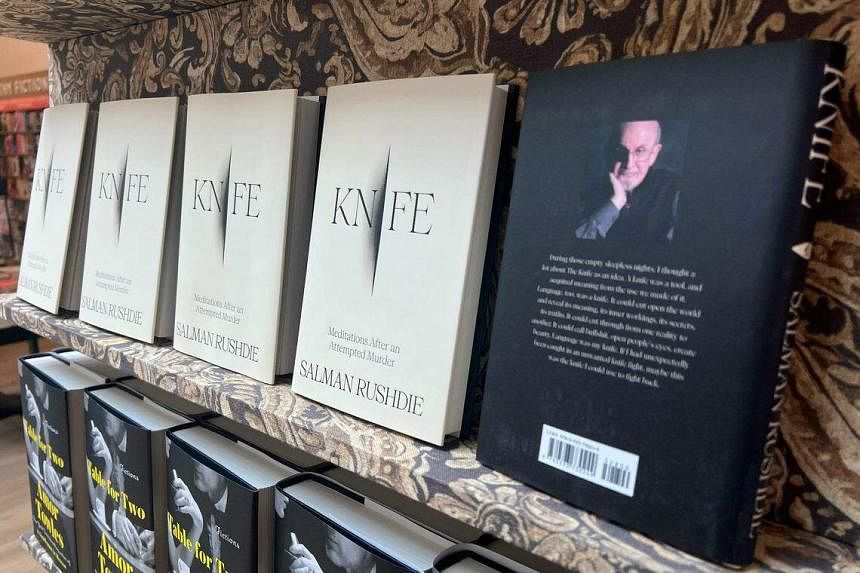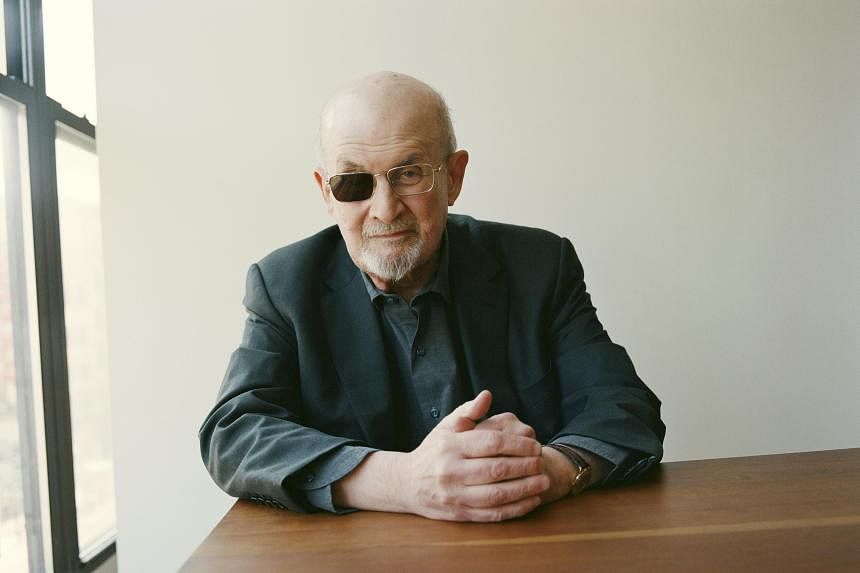NEW YORK – Last May, nine months after the 2022 knife attack that nearly killed him, Salman Rushdie made a surprise appearance at the 2023 PEN America literary gala.
His voice was weak, and he was noticeably thinner than usual. One of his eyeglass lenses was blacked out, as his right eye had been blinded in the assault.
But anyone wondering whether the India-born British-American author was still his old exuberant self would have been immediately reassured by the way he began his remarks, with a racy impromptu joke.
It was classic Rushdie, improvisational literary wit deployed during a solemn occasion – in this case, his acceptance of the organisation’s Centenary Courage Award. It was also a triumphant signal that his brush with death – more than three decades after Iran’s first supreme leader Ayatollah Ruhollah Khomeini issued a fatwa calling for Rushdie’s killing over the 1988 novel The Satanic Verses – had dampened neither his spirit nor his determination to live life in the open.
The 76-year-old’s new book Knife, which was published on April 16, is a harrowing account of the attack and its aftermath, as well as a reminder of how gravely injured he was. It is also a deeply moving love story that attributes much of his recovery and good spirits to the tender, brave support of his wife of three years, American poet and novelist Rachel Eliza Griffiths, 46.
“I wanted to write a book which was about both love and hatred – one overcoming the other,” Rushdie said in a recent interview. “And so it’s a book about both of us.”
Nearly a year had passed since the PEN speech. The Rushdie sitting in the Manhattan office of his long-time agent is still dealing with the physical repercussions of the attack, including bouts of fatigue. One side of his mouth pulls a bit when he talks, the result of damage to a nerve in his neck. His left hand has only partially recovered, and his right eye is permanently unusable.
Though Rushdie considered calling his new book A Knife In The Eye, a reference to the worst of his injuries, he decided on a single-word title, as sharp and staccato as the object itself. Knife can mean many things, he writes. It is a weapon, of course, and an artistic device in books, movies and paintings.
In his book, it is a metaphor for understanding. “Language can be that kind of knife, the thing that cuts through to the truth,” he said. “I wanted to use the power of literature – not just in my writing, but also in literature in general, to reply to this attack.”
On Aug 12, 2022, Rushdie was onstage at the Chautauqua Institution in western New York – ironically, he was speaking about City of Asylum, a programme that provides safe haven to writers under threat – when a black-clad man ran full-tilt onto the stage, wielding a knife. The man, Hadi Matar, has pleaded not guilty to charges of second-degree assault and second-degree attempted murder and is awaiting trial.
The blade struck Rushdie 10 times. It severed the tendons and most of the nerves in his left hand, and injured his right eye, destroying the optic nerve.
Knife is a visceral, intimate book, in contrast to an earlier memoir, Joseph Anton – a 2012 book that was written in the third person, so that the central character existed on the same level as the supporting players.
“I wanted it to read like a novel,” Rushdie explained of the earlier book.
But Knife is different. “This is not novelistic. I mean, somebody sticks a knife in you, that’s pretty personal. Pretty first person,” he said.

The book contains a long passage in which Rushdie imagines interrogating his assailant, but he never mentions him by name. “My Assailant, my would-be Assassin, the Asinine man who made Assumptions about me, and with whom I had a near-lethal Assignation,” he writes. “I will refer to him more decorously as ‘the A’. What I call him in the privacy of my home is my business.”
Rushdie said he wants to be thought of foremost as a novelist. But he has always felt, even before the fatwa, an obligation to be engaged in public matters. For years, he served as president of PEN America, in the forefront of its fights on behalf of free speech.
Presenting Rushdie’s award to him in 2023, PEN America’s then-president, playwright and novelist Ayad Akhtar, said the group was honouring him “because of what he stood for and continues to stand for, and what this organisation is fundamentally all about – freedom”.
Akhtar added: “He has enlarged the world’s imaginative capacities, and at such great cost to himself.”
But Rushdie said that he does not see himself as a symbol of anything.
“I’ve never felt symbolic. I felt – you know, I’m just here.” He laughed. “I’m just Ken.” (This was an allusion to Canadian actor and Barbie (2023) star Ryan Gosling’s showstopping song at the Oscars, the night before the interview.
“I’m just me. I’m just somebody who’s trying to be a writer, trying to do his best. And that’s all I’ve ever wanted to be.” NYTIMES

